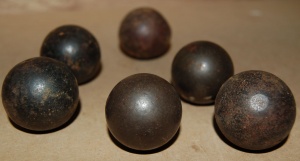Difference between revisions of "Template:Article of the moment"
m |
|||
| Line 21: | Line 21: | ||
<option>{{:Snapping matchlock}}</option> | <option>{{:Snapping matchlock}}</option> | ||
<option>{{:Bullet bow shockwave}}</option> | <option>{{:Bullet bow shockwave}}</option> | ||
| + | <option>{{:Beecher's Bibles}}</option> | ||
</choose><noinclude> | </choose><noinclude> | ||
==Usage== | ==Usage== | ||
Latest revision as of 13:32, 13 June 2013

Musket balls were of a diameter considerably larger than today's modern rifles - the Brown Bess fielded a caliber of more than .75", and hence the ball could cause large wounds. The smooth bore muskets of the Brown Bess period had considerable hitting power and were able to penetrate the armour of the day, but had very limited accuracy due to the lack of rifling in the barrel. In practice muskets were fired at close range in volley fire, and rarely beyond the 50-yard range. The rifled muskets of the American Civil War were much more accurate, making combat ranges of 300 yards - or even more - practical. The term 'ball' lingered on in that conflict as applied to the standard ammunition used by both sides - the Minié ball, for one example. However the Minie ball was not a ball at all, but a conical lead bullet designed to be fired down a rifled barrel. With the invention of the Minie ball and the development of the bullet cartridge or round, the musket ball became obsolete after the middle of the nineteenth century due to its inaccuracy.
[edit] References
[edit] Usage
Just a list of short article titles for the main page. Use this code to make additions:
<option>{{:}}</option>